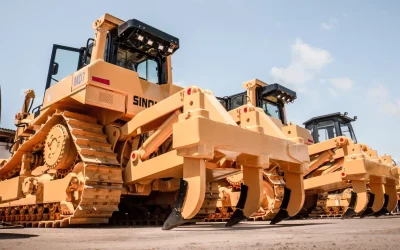6 Powerful Skills You’ll Master in Heavy Machinery Training
6 Powerful Skills You’ll Master in Heavy Machinery Training is what you will learn. Both of my hands were sweaty as I initially got into the excavator seat. The controls appeared difficult, and the idea of controlling thousands of pounds of soil with accuracy seemed impossible to imagine.
But after weeks of training, something amazing happened: I felt in control. I could lift, turn, and grade with confidence. More significantly, I understood that mastering heavy machinery involved more than just pushing buttons and pulling levers.
It was about developing abilities that would help shape my job and keep me safe. And let me tell you skill #5 completely changed the way I work. If you’re considering becoming a heavy machinery operator in Uganda, Congo, Rwanda, South Sudan or more, you’re in for an exciting adventure.
Let’s look at the six most powerful skills you’ll learn in training and why they’re so crucial for any heavy machinery operator in Uganda, Congo, Rwanda, South Sudan or more.
Skill 1: Accuracy Control; The Art of Smooth Operation
At first, you’ll feel like a baby deer on ice jerky movements, oversteering, and struggling to keep control. But as you train, something clicks.
Why It’s Important:
- Prevents accidents initiated by rough handling.
- Reduces fuel consumption and machine wear.
- Improves efficiency every move counts.
How You’ll Learn It:
- Practicing slow, controlled movements.
- Understanding lever sensitivity for fine adjustments.
- Training with an experienced mentor who corrects your mistakes.
Skill 2: Reading the Environment Like a Professional
A skilled operator can “read” the ground before even starting the machine. One time, I saw an inexperienced dozer operator get stuck because he didn’t check the soil condition. We spent half a day pulling that machine out.
Why It’s Important:
- Avoids costly delays and machine damage.
- Ensures the ground is stable enough for heavy loads.
- Helps plan the safest and most efficient path.
How You’ll Learn It:
- Studying different soil types (mud, sand, gravel, clay).
- Learning to identify hidden dangers like underground utilities.
- Practicing safe steering on slopes and rough ground.
Skill 3: Machine Maintenance; Your Equipment’s Lifeline
Would you drive a car without checking the brakes? Heavy machinery is the same. In training, you will discover that good maintenance is essential for survival.
Why It’s Important:
- Prevents costly breakdowns and job delays.
- Increases machine lifespan, saving the company money.
- Keeps you and your team safe.
How You’ll Learn It:
- Conducting daily pre shift inspections.
- Identifying warning signs (strange noises, leaks, vibration).
- Understanding the importance of lubricants, filters, and hydraulics.
Skill 4: Communication; The Hidden Superpower
Believe it or not, communication is one of the most critical abilities in heavy machinery operation. I once worked on a job site where a simple mistake resulted in a near-miss between an excavator and a dump truck. It could’ve been terrible.
Why It’s Important:
- Prevents accidents caused by misinterpretations.
- Keeps projects on schedule with clear instructions.
- Builds teamwork and trust on the job site.
How You’ll Learn It:
- Using radio communication effectively.
- Learning hand signals for when radios fail.
- Practicing clear, direct communication with ground crews.
Skill 5: Situational Awareness; The Game Changer
This one surprised me the most. Most individuals believe that operating heavy machinery just involves controlling the machine. But what’s the truth? Your eyes and thoughts are your most valuable instruments.
Situational awareness is constantly checking your surroundings for potential hazards, such as workers walking too close, unstable environment, or unforeseen barriers.
Why It’s Important:
- Prevents deadly accidents before they happen.
- Helps you react quickly to unexpected situations.
- Keeps everyone on site safe.
How You’ll Learn It:
- Practicing techniques, checking mirrors, blind spots, and surroundings.
- Learning to anticipate potential hazards before they become a problem.
- Developing a habit of pausing and assessing before making moves.
This skill saved my life once. I noticed a worker standing behind my excavator before I reversed. If I hadn’t checked, I don’t even want to think about what could have happened.
Skill 6: Time and Resource Management; Be the Operator Everyone Trusts
The best operators aren’t just good at handling machines they know how to manage their time and resources efficiently.
Why It’s Important:
- Helps complete projects on time and within budget.
- Minimizes fuel and material waste.
- Increases your value as an operator companies love efficient workers!
How You’ll Learn It:
- Planning work arrangements to minimize unnecessary movements.
- Understanding fuel efficiency techniques.
- Learning to coordinate with other operators for smooth workflow.

In a nutshell, heavy machinery training entails more than just learning how to move soil; it also includes acquiring the skills that will make you a safe, efficient, and valuable operator. Now it’s your turn.
Are you prepared to take the first step toward a successful career at Friendly Heavy Equipment and Machinery Training School? Feel free to contact us for help.






